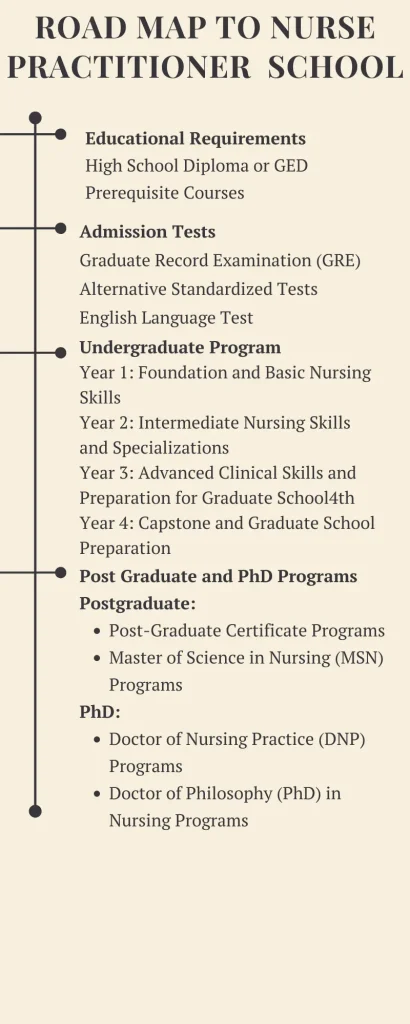How Long is Nurse Practitioner School? The duration typically ranges from 2 to 4 years, depending on the program and whether you attend full-time or part-time. This includes earning a Master’s or Doctoral degree in nursing, clinical training, and specialized coursework to prepare for advanced practice roles in healthcare.
What is Nurse Practitioner School?
Nurse practitioner school is an advanced educational program designed for registered nurses who aspire to become nurse practitioners (NPs). This specialized training includes coursework in advanced clinical skills, diagnostic procedures, and patient management.

Students also complete supervised clinical practice to gain hands-on experience in diagnosing and treating patients. The curriculum aims to prepare future NPs for a range of roles in healthcare settings, from primary care to specialty fields.
How Long is Nurse Practitioner School?
Here’s a detailed, year-by-year breakdown of the typical undergraduate-to-graduate pathway for becoming a nurse practitioner (NP).
Year 1: Foundation and Basic Nursing Skills
Overview: In the first year, students build a solid foundation in nursing principles and practices.
Key Courses:
- Introduction to Nursing: Basic nursing theories and history.
- Human Anatomy and Physiology: Understanding body systems and functions.
- Fundamentals of Nursing: Basic clinical skills and patient care techniques.
- Pharmacology: Introduction to medications, their effects, and safe administration.
- Health Assessment: Techniques for assessing patient health and identifying issues.
Clinical Experience: Initial hands-on experience in a healthcare setting under supervision, focusing on basic patient care and observation.
Year 2: Intermediate Nursing Skills and Specializations
Overview: The second year delves deeper into nursing practices and begins to introduce specialized topics.
Key Courses:
Medical-Surgical Nursing: Care for adult patients with various medical conditions.
Pediatric Nursing: Principles of care for infants, children, and adolescents.
Mental Health Nursing: Techniques for managing mental health issues and psychiatric care.
Maternal and Newborn Nursing: Care for pregnant women, labor, delivery, and newborns.
Clinical Experience: More advanced clinical rotations in different healthcare settings, including specialized units like pediatrics, maternity, and mental health.
Year 3: Advanced Clinical Skills and Preparation for Graduate School
Overview: In the third year, students refine their clinical skills and start preparing for advanced education.
Key Courses:
Advanced Medical-Surgical Nursing: Complex patient care and disease management.
Nursing Research: Introduction to research methodologies and evidence-based practice.
Leadership and Management: Skills for leadership roles in nursing and healthcare management.
Community Health Nursing: Public health concepts and community-based care.
Clinical Experience: Advanced rotations with increased responsibility, including leadership roles and project-based learning in community health.
Year 4: Capstone and Graduate School Preparation
Overview: The final year focuses on consolidating knowledge, completing a capstone project, and preparing for graduate school.
Key Courses:
- Capstone Project: A comprehensive project or thesis demonstrating clinical and research skills.
- Advanced Pathophysiology: In-depth study of disease mechanisms and their implications for nursing care.
- Advanced Pharmacology: Expanded study of medications and their therapeutic uses.
Clinical Experience: Capstone clinical experiences that integrate all aspects of nursing education, often with a focus on advanced care scenarios.

How to Enter Nurse Practitioner School
Educational Requirements
High School Diploma: Strong performance in science subjects such as Biology, Chemistry, and Physics.
Intermediate Degree: In many countries, an intermediate degree with a focus on pre-medical courses is required. This typically includes courses in Biology, Chemistry, Physics, and Mathematics.
Entry Tests for Nurse Practitioner School
Graduate Record Examination (GRE)
Requirement: Some NP programs require the GRE.
Details: The GRE assesses verbal reasoning, quantitative reasoning, and analytical writing.
Preparation: GRE Test Prep Resources
Test of English as a Foreign Language (TOEFL) or International English Language Testing System (IELTS)
Requirement: For non-native English speakers.
Details: Tests proficiency in English if your primary language is not English.
Preparation: TOEFL Exam Information
Alternative Standardized Tests
Requirement: Some programs may accept other standardized tests.
Details: Check specific program requirements for acceptable tests.
Resources: Graduate Admissions Tests
Application Process for Nurse Practitioner School
- Research and Select Programs
Details: Identify NP programs that align with your career goals and interests.
Resources: Directory of NP Programs
2. Prepare Application Materials
Components: Commonly required materials include:
Transcripts: Official transcripts from all post-secondary institutions.
Resume/Curriculum Vitae: Detailed professional and academic background.
Statement of Purpose: A personal essay outlining your career goals and reasons for pursuing an NP degree.
Letters of Recommendation: Typically 2-3 letters from professional or academic references.
Application Form: Completed application forms for each program.
Resources: How to Write a Statement of Purpose
3. Submit Applications
Details: Complete and submit applications through the program’s application portal or common application services.
Resources: Common Application Services
4. Interview
Requirement: Some programs require an interview as part of the selection process.
Details: Prepare to discuss your background, goals, and understanding of the NP role.
Resources: Interview Preparation Tips
5. Await Admission Decision
Details: Review the admission decision and follow the instructions for acceptance or enrollment.
Financial Aid for Nurse Practitioner School
Scholarships
Types: Scholarships based on merit, need, or specific criteria.
Examples:
American Association of Nurse Practitioners (AANP) Scholarships
Nursing Scholarship Opportunities
Grants
Types: Financial aid that does not require repayment.
Examples:
Federal Nursing Student Loans and Grants
Nurse Corps Scholarship Program
Federal Student Loans
Types: Loans that must be repaid, with various repayment options.
Examples:
Direct Subsidized Loans
Direct Unsubsidized Loans
Work-Study Programs
Types: Part-time jobs that help pay for school.
Examples:
Federal Work-Study Program
Employer Tuition Assistance
Types: Financial support from employers for education.
Examples:
Employer Tuition Assistance Programs
Payment Plans
Types: Structured plans to pay tuition over time.
Post-graduate and PhD Programs
1. Post-Graduate Certificate Programs
Post-graduate certificate programs are designed for nurse practitioners who wish to specialize in a new area of practice or enhance their clinical skills.
Types of Programs:
Advanced Practice Registered Nurse (APRN) Certifications: For NPs seeking to become certified in a specific specialty.
Post-Graduate Certificates in Specific Fields: Includes certifications such as Family Nurse Practitioner (FNP), Pediatric Nurse Practitioner (PNP), or Acute Care Nurse Practitioner (ACNP).
2. Master of Science in Nursing (MSN) Programs
MSN programs offer advanced training for NPs aiming to deepen their expertise in specialized clinical areas or administrative roles.
Types of Programs:
Clinical Specialties: Such as Family Nurse Practitioner, Pediatric Nurse Practitioner, and Psychiatric Mental Health Nurse Practitioner.
Administrative and Leadership Roles: Programs focusing on nursing administration, education, or informatics.
3. Doctor of Nursing Practice (DNP) Programs
DNP programs are terminal degrees in nursing focused on clinical practice, leadership, and evidence-based practice.
Types of Programs:
Clinical DNP: Emphasizes advanced clinical practice skills.
Executive DNP: Focuses on leadership, management, and policy development.
4. Doctor of Philosophy (PhD) in Nursing Programs
PhD programs focus on research, theory development, and academic careers in nursing.
Types of Programs:
Research-Focused PhD: Emphasizes generating new knowledge through research.
Academic PhD: Prepares graduates for faculty positions and academic leadership.
Top 10 Nurse Practitioner Schools

1. University of Pennsylvania
Program: MSN, DNP, PhD
Specialties: Family Nurse Practitioner, Pediatric Nurse Practitioner, Psychiatric Mental Health Nurse Practitioner, Acute Care Nurse Practitioner
2. Johns Hopkins University
Program: MSN, DNP, PhD
Specialties: Family Nurse Practitioner, Pediatric Nurse Practitioner, Adult-Gerontology Acute Care Nurse Practitioner, Psychiatric Mental Health Nurse Practitioner
3. Vanderbilt University
Program: MSN, DNP, PhD
Specialties: Family Nurse Practitioner, Pediatric Nurse Practitioner, Acute Care Nurse Practitioner, Psychiatric Mental Health Nurse Practitioner
4. Duke University
Program: MSN, DNP, PhD
Specialties: Family Nurse Practitioner, Adult-Gerontology Acute Care Nurse Practitioner, Pediatric Nurse Practitioner, Psychiatric Mental Health Nurse Practitioner
5. University of California, San Francisco (UCSF)
Program: MSN, DNP, PhD
Specialties: Family Nurse Practitioner, Pediatric Nurse Practitioner, Adult-Gerontology Primary Care Nurse Practitioner, Psychiatric Mental Health Nurse Practitioner
6. University of Michigan
Program: MSN, DNP, PhD
Specialties: Family Nurse Practitioner, Adult-Gerontology Acute Care Nurse Practitioner, Pediatric Nurse Practitioner, Psychiatric Mental Health Nurse Practitioner
7. Emory University
Program: MSN, DNP, PhD
Specialties: Family Nurse Practitioner, Pediatric Nurse Practitioner, Adult-Gerontology Acute Care Nurse Practitioner, Psychiatric Mental Health Nurse Practitioner
8. University of Washington
Program: MSN, DNP, PhD
Specialties: Family Nurse Practitioner, Pediatric Nurse Practitioner, Adult-Gerontology Acute Care Nurse Practitioner, Psychiatric Mental Health Nurse Practitioner
9. University of North Carolina at Chapel Hill
Program: MSN, DNP, PhD
Specialties: Family Nurse Practitioner, Pediatric Nurse Practitioner, Adult-Gerontology Primary Care Nurse Practitioner, Psychiatric Mental Health Nurse Practitioner
10. Boston College
Program: MSN, DNP, PhD
Specialties: Family Nurse Practitioner, Pediatric Nurse Practitioner, Adult-Gerontology Acute Care Nurse Practitioner, Psychiatric Mental Health Nurse Practitioner
Factors Affecting the Length of Nurse Practitioner School
1. Type of Degree Program
The type of NP program you choose affects how long it takes to complete your education and training.
2. Program Format
The format of the NP program can impact its duration, with various formats offering different schedules.
3. Student’s Previous Educational Background
Your prior education and experience can affect how long it takes to complete the NP program.
4. Specialty Track Chosen
Different NP specialties have varying requirements and lengths for completion.
5. Clinical Requirements
The number of clinical hours and types of clinical experiences required can vary based on the program and specialty.
6. Full-Time vs. Part-Time Enrollment
Whether you attend full-time or part-time affects the length of time it takes to complete the program.
Final Verdict
Choosing the right NP school and understanding how long it takes are crucial for your career planning. By considering factors like program type, enrollment status, and specialization, you can better manage your time and set realistic goals for achieving your Nurse Practitioner certification and advancing your nursing career.
FAQs
How long does it take to become a Nurse Practitioner?
Typically, NP programs take 2-4 years to complete, depending on whether you enroll full-time or part-time and your chosen specialization.
What factors affect the length of NP school?
Factors include program type (MSN vs. DNP), full-time vs. part-time enrollment, prior education, clinical hour requirements, and personal commitments.
Can I complete an NP program faster by studying full-time?
Yes, full-time students can complete MSN programs in about 2 years and DNP programs in approximately 3 years.
Are there accelerated NP programs available?
Yes, some schools offer accelerated or combined degree programs, such as BSN-to-DNP, which can shorten the duration of your studies.
What should I consider when choosing between MSN and DNP programs?
Consider your career goals, whether you aim for advanced clinical practice or leadership roles. MSN programs are shorter and focus on clinical skills, while DNP programs emphasize leadership and practice improvement.
